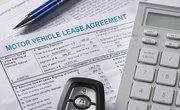
Have you ever received an email from your car dealership offering you a great deal on a lease buyout? The email might have been your first clue that you could dispose of your lease before the end date. During automobile shortages, dealerships frantically look for vehicles to sell, including ones they acquire through lease buyouts. Before you decide whether to buy out a lease, arm yourself with the facts and figures so that you can drive the best deal possible.
How to Buy Out a Lease
You’ll first need to check your records for several important facts, including the vehicle’s residual value, the number of remaining lease payments, the amount of each payment and any excess mileage penalties attached to the lease. You’ll also need to know your state’s sales tax rate. After running the numbers, you are in an excellent position to demand the best deal on a lease buyout. To proceed, you’ll need to calculate your remaining lease liability, the buyout amount and your equity in the vehicle.
Calculating Your Remaining Lease Liability
You first need to calculate how much you owe on your lease:
Remaining Lease Liability = Number of Remaining Payments x Payment Amount
For example, suppose you just finished the second year of a three-year car lease. Assume you do not face any excess mileage charges and the vehicle is in excellent condition. You have 12 more payments of $310 each, giving you a total remaining lease liability of $3,720 (12 x $310).
You could pay the $3,720, drop off the car at the dealership and walk away, but you might be able to do much better by either buying the car or using its value to purchase a replacement. In both cases, you need to know the car’s residual value and current value.
Determining Your Buyout Amount
According to the Federal Trade Commission, when you lease a car, you are paying for only the vehicle's depreciation. The residual is the vehicle’s projected value at the lease end (i.e., the value remaining after depreciation). The lease specifies the residual value, a percentage of the car’s original manufacturer’s suggested retail price (MSRP).
The dealership sets a vehicle’s residual value at 60 percent of its MSRP in this example. If the car’s original MSRP was $36,000, the residual value is $21,600, the locked-in purchase price at lease end.
To buy the car with 12 months of lease remaining, you have to cough up the residual value plus the remaining lease liability:
Buyout Amount = Remaining Lease Liability + Residual Value
In this case, the buyout amount (also called the payoff amount) equals $25,320 ($3,720 + $21,600), ignoring possible lease-end fees (e.g., excess mileage, excess wear and tear, return fee, etc.). These fees are one of the risks of leasing a car.
Factoring in Equity
You may have equity in your leased vehicle, which is the amount that the current value exceeds the payoff amount. If you have a positive equity amount, you can apply it as a down payment toward a new vehicle purchase or lease. The formula for determining your equity is:
Equity = Current Value - Dealer’s Margin - Buyout Amount
In this example, the dealer can sell your leased vehicle for $30,000, of which it is willing to allocate $28,000 to you and keep the remaining $2,000 as its margin on the deal. Your equity in the car 12 months from lease end is $2,680 ($30,000 - $2,000 - $25,320). The dealership will let you apply the equity to a new vehicle purchase or lease as a down payment.
Alternatively, you could purchase the leased vehicle for the buyout amount and then resell it yourself, presumably for $30,000 instead of $28,000. However, you will have to pay in cash or take out a loan to purchase the leased vehicle. For many folks, the most straightforward approach is to take the buyout deal and apply the equity to a new car from the same dealership.
Of course, you’ll also have to pay the sales tax on the vehicle plus any dealer prep, documentation and other fees. The interest rate to finance your new car may differ substantially from your previous car’s lease.
Understanding lease calculations can help you avoid the type of lease buyout scams detailed by ABC7 New York. With potentially thousands of dollars at stake, it's a good idea to understand how some dealerships try to tack on phony charges when a lease ends.
References
Writer Bio
Eric Bank is a senior business, finance and real estate writer, freelancing since 2002. He has written thousands of articles about business, finance, insurance, real estate, investing, annuities, taxes, credit repair, accounting and student loans. Eric writes articles, blogs and SEO-friendly website content for dozens of clients worldwide, including get.com, badcredit.org and valuepenguin.com. Eric holds two Master's Degrees -- in Business Administration and in Finance. His website is ericbank.com.

